
Since its return to democracy in 1990, Chile has been an active participant in the regional and international arena. Chile assumed a two-year non-permanent position on the UN Security Council in January 2003 and was re-elected to the council in October 2013. It is also an active member of the UN family of agencies, serving as a member of the Commission on Human Rights and participating in UN peacekeeping activities. Chile hosted the second Summit of the Americas in 1998, was the chair of the Rio Group in 2001, hosted the Defense Ministerial of the Americas in 2002, and the APEC summit and related meetings in 2004. In 2005 it hosted the Community of Democracies ministerial conference. It is an associate member of Mercosur and a full member of APEC. The OECD agreed to invite Chile to be among four countries to open discussions in becoming an official member.

The foreign relations of Finland are the responsibility of the president of Finland, who leads foreign policy in cooperation with the government. Implicitly the government is responsible for internal policy and decision making in the European Union. Within the government, preparative discussions are conducted in the government committee of foreign and security policy, which includes the Prime Minister and at least the Minister of Foreign Affairs and the Minister of Defence, and at most four other ministers as necessary. The committee meets with the President as necessary. Laws concerning foreign relations are discussed in the parliamentary committee of foreign relations. The Ministry of Foreign Affairs implements the foreign policy.
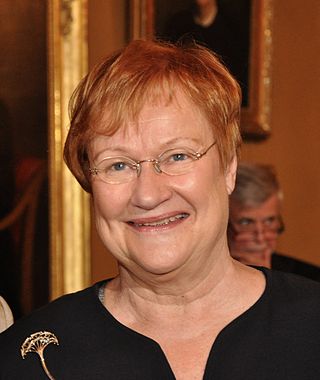
Tarja Kaarina Halonen is a Finnish politician who served as the 11th president of Finland, and the first and to date only woman to hold the position, from 2000 to 2012. She first rose to prominence as a lawyer with the Central Organisation of Finnish Trade Unions (SAK), and as the Prime Minister's parliamentary secretary (1974–1975) and a member of the City Council of Helsinki (1977–1996). Halonen was a Social Democratic Party member of parliament from 1979 until her election to the presidency in 2000. She also served as a minister at the Ministry of Social Affairs and Health from 1987 to 1990, as Minister of Justice from 1990 to 1991, and as Minister for Foreign Affairs from 1995 to 2000.

Erkki Sakari Tuomioja is a Finnish politician and has previously been a member of the Finnish Parliament. From 2000 to 2007 and 2011 to 2015, he served as the minister for foreign affairs. He was president of the Nordic Council in 2008.

Canada and Chile established diplomatic relations in 1892. Both nations are members of the Asia-Pacific Economic Cooperation, Cairns Group, Organization of American States, and the Organisation for Economic Co-operation and Development.
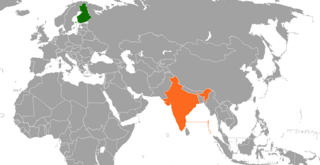
Finland–India relations are the bilateral relations betweeen Finland and India. Finland has an embassy in New Delhi. India has an embassy in Helsinki, that is also jointly accredited to Estonia.

Finland–Mozambique relations refers to the bilateral relationship of Finland and Mozambique. Finland recognised Mozambique on July 4, 1975. Both countries established diplomatic relations on July 18, 1975. Mozambique is represented in Finland through its embassy in Stockholm, Sweden. Finland has an embassy in Maputo. In November 2008, Finland's President Tarja Halonen called her country's relationship with Mozambique "excellent".

Finland–Namibia relations refers to the bilateral relationship of Finland and Namibia. Finland recognised Namibia on March 21, 1990. Both countries established diplomatic relations on the same day. Namibia has an embassy in Helsinki while Finland has an embassy in Windhoek and an honorary consulate in Walvis Bay.

Finland-Italy relations are foreign relations between Finland and Italy. Both countries established diplomatic relations on 6 September 1919. Finland has an embassy in Rome, Italy has an embassy in Helsinki. Both countries are full members of the European Union, NATO, Organization for Security and Co-operation in Europe, Council of Europe and the Eurozone.

Bilateral relations between the Argentina and Finland, have existed for over a century.

The nations of Finland and Mexico established diplomatic relations in 1936. Both nations are members of the Organisation for Economic Co-operation and Development and the United Nations.
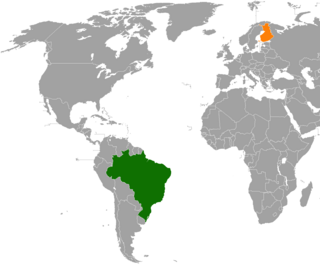
Brazil–Finland relations are the diplomatic relations between Brazil and Finland.

Finland–Spain relations are the bilateral relations between Finland and Spain. Both nations are members of the Council of Europe, the European Union, the United Nations, the Schengen Area, the eurozone, and NATO. Spain strongly supported Finland's NATO membership during the latter's accession process. Spain is also one of the favorite destinations of Finnish tourism. Approximately ten percent of the Finnish population travels on vacation each year to Spain. Furthermore, the Finns are the fastest growing European community in Málaga, as Fuengirola is home to the second largest colony of Finns in the world, after Sweden.
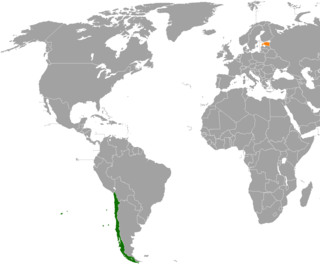
Chile–Estonia relations are foreign relations between Chile and Estonia. Chile re-recognized Estonia on August 28, 1991 and diplomatic relations between the two countries were established on September 27, 1991. Chile is represented in Estonia through its ambassador who resides in Helsinki (Finland) and through an honorary consulate in Tallinn. Estonia is represented in Chile through an honorary consulate in Santiago. The current Chilean ambassador to Estonia, Carlos Parra Merino, officially presented his credentials to the Estonian President Toomas Hendrik Ilves in June 2007. Carlos Parra Merino resides in Helsinki.

Chile–Israel relations refers to the bilateral and diplomatic ties between Chile and Israel. Chile recognized Israel's independence in February 1949. Both countries established diplomatic relation on 16 May 1950, with Israel sending their first ambassador on that date and Chile sending their first ambassador on 16 June 1952. Chile has an embassy in Tel Aviv. Israel has an embassy in Santiago.
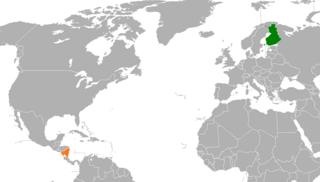
Finland–Nicaragua relations are foreign relations between Finland and Nicaragua. Finland is accredited to Nicaragua from its embassy in Mexico City, Mexico. Nicaragua has an honorary consulate in Helsinki.

Jarmo Viinanen is a former Finnish ambassador to Sweden until 2016, and was President of the UNICEF Executive Board in 2013. In addition to this, Viinanen was, from 1997 until 1998, the First Secretary in the Foreign Ministry's Department of External Trade Relations. From 1998 to 2000, Viinanen was the Adviser to the Minister of Foreign Affairs. Between 2000 and 2005, Viinanen served as the diplomatic adviser to Tarja Halonen, the 11th President of Finland, the Deputy Secretary General and Deputy Chief of Cabinet, as well as the Secretary-General and Chief of Cabinet to Halonen from 2005–2009. Between 8 April 2009 and 2014 Viinanen held a position as the Permanent Representative of Finland to the United Nations.

Chile–Sweden relations refers to the diplomatic relations between Chile and Sweden. Both nations enjoy friendly relations, the importance of which centers on the history of Chilean migration to Sweden during the 1970s. Approximately 100,000 Chileans and their descendants reside in Sweden, making the country home to the third largest Chilean diaspora community. Both countries are members of the Organisation for Economic Co-operation and Development.

Chile–Japan relations are the diplomatic relations between Chile and Japan. Both nations are members of the Asia-Pacific Economic Cooperation, Comprehensive and Progressive Agreement for Trans-Pacific Partnership, Forum of East Asia–Latin America Cooperation and the Organisation for Economic Co-operation and Development.
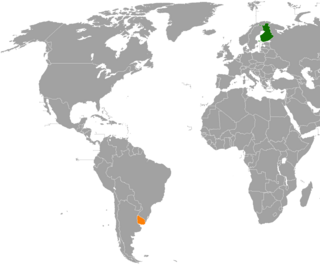
Finland–Uruguay relations are the bilateral relations between Finland and Uruguay. Both nations are members of the United Nations.
























